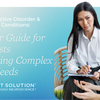Men's Mental Health: 7 Ways To Manage Your Depression

It's normal to feel sad, irritable, angry, low, or confused about life; everyone experiences these issues from time to time. But all these are also some of the common signs of stress, depression, and other mental health issues. Sometimes, the emotions subside quickly, and you get back on your feet and feel like your usual self after a few days. However, this doesn’t always happen. If you believe these problems are seriously affecting your mental health, you should seek assistance immediately.
Although they affect everyone, mental health issues have different effects on different people depending on their gender. This is primarily due to the stigma and preconceived notions about men’s mental health. Finding help and support for coping with mental health issues can be harder for men than for women due to the stigma.
So why is there a stigma around men's mental health issues, and how can men better manage their depression? This article discusses seven ways that can help you cope with depression and enjoy your life more.
Reason For Stigma Around Men's Depression
Society has, over the years, portrayed men as strong beings, heads of families, and breadwinners. This essentially places them in a position where they are always expected to be tough and strong under pressure. As a result of this stigma, men may view openly discussing mental health issues and seeking help about them as signs of weakness.
On the other hand, men might also be reluctant to show weaknesses out of concern for how society will perceive them. Some men are forced to conceal their anxieties because they fear losing other people’s respect. Others won't even be willing to accept a diagnosis for their condition or the management recommendations offered to them.
Therefore, it is crucial to raise awareness and educate society that mental health issues cut across the gender divide. It'll also help reshape society's masculinity perception to allow men to become more open to accepting help.
Ways To Manage Your Depression
There are various ways men can manage their depression effectively and eventually overcome it. Managing depression mainly involves seeking help through medication, therapy, and making some lifestyle changes. Below are various ways to help you manage depression:
1. Undergoing Therapy
Therapy can be effective in helping you cope with depression. Professional counselors or psychologists offer this to help with depression and mental health conditions. There are various types of therapies that can help you manage depression. Here are some common types of therapies for managing depression symptoms:
- Light Therapy: Also known as phototherapy, is the use of artificial light to help manage symptoms of depression. It's especially considered effective for managing seasonal depression because the length of exposure to light is linked to emotional and mental well-being. A person’s mental state may be impacted by shorter daylight hours in certain seasons or by spending a lot of time in dimly lit areas. You can learn more about light therapy from https://lighttherapy.org and other reputable resources.
- Cognitive Behavioral Therapy (CBT): This is where a professional helps you to identify various negative thoughts affecting your mental health, the associated behaviors, and ways to manage and change them. It's about turning damaging beliefs into positive ones and adjusting your behavior accordingly.
-
Dialectical Behavior Therapy (DBT): Depression can often lead to emotional outbursts. In DBT, the therapist helps you become more mindful of your emotions as they happen and helps you identify, accept, control, or manage your emotions better. This therapy basically enables you to define how you act or react toward issues.
- Interpersonal therapy: This method helps you address interpersonal conflict and issues that contribute to your mental health. It helps you identify relationships and social connections, how they affect your life and well-being, and what to do about them
However, it's important to note that therapy is unique to you and will work differently in various situations. These situations include the type you choose, the severity of your symptoms, your response to it, and your therapist of choice. Having a good rapport with your therapist can help a lot in your response to the therapy and, consequently, how you manage your depression.
2. Use Medication
One of the most effective ways to manage depression is taking prescribed medication. Medication for managing depression symptoms primarily focuses on serotonin, a chemical in the brain that regulates mood. However, you need to watch closely how you react to the medication and notify your doctor of any side effects you may experience. Also, it's essential to take your medications as prescribed.
3. Establish A Support System
A robust support system is critical to managing depression and other mental health issues. While you might feel the need to go through it alone because you believe it to be a battle you’ve been fighting since you were a child or because you feel pressure to live up to certain expectations, keep in mind that you're still a social being like everybody else. Social connections with other people are essential for your mental health and wellness.
In challenging circumstances, such as when battling depression, having a strong support system is very helpful. It opens a door for you to have someone or some people you can confide in when you're feeling overwhelmed. It also gives you a chance to offer a helping hand to people in your circle who are going through challenges. This helps you establish a sense of purpose, a crucial thing in coping and managing feelings of depression more effectively.
4. Avoid A Sedentary Lifestyle
When you're battling depression, working out might be the last thing on your mind. However, moving about is essential in managing stress and depression, even when undergoing therapy or taking antidepressant medication. First, exercise is an excellent way to boost your mood and take your mind off things pressuring you. This step away from negative thoughts can help break the cycle of depression triggers.
Second, it boosts your physical health and general well-being, giving you more resilience which can help in dealing with challenging emotions and situations. Besides, it can also help you feel better about yourself and boost your confidence and self-worth. While depression may cause feelings of insecurity and unworthiness, physical fitness can improve how you look and feel about yourself. So, make it a habit to move around and set aside time each day to engage in moderate exercise.
5. Get Enough Sleep
A good night's sleep is essential to physical and mental health and well-being. Getting enough sleep helps your brain to calm down and lets your mind take a break from the things that are worrying you when you're awake. Depression often inhibits a good night's sleep, leaving your brain to overwork itself. Therefore, you need to find a way to get enough sleep.
You might be having difficulties falling asleep or staying asleep all night. One of the ways to ensure you're getting a good night's sleep each day is by creating a schedule you can adhere to. In addition, you should avoid the things that may distract you, such as television in the bedroom or mobile devices. Give yourself time to wind down and prepare your mind for bedtime.
You might also want to try using essential oils with scents such as lavender, cedarwood, peppermint, sandalwood, and chamomile, which are believed to help induce sleep. Ultimately, you want to create conditions that will allow you to get enough sleep daily and give your brain a chance to rest and rejuvenate.
Lastly, you may try integrating wearable stress relieving devices, such as TouchPoints, into your bedtime routine. TouchPoints' proprietary neuroscience technology uses gentle, alternating micro-vibrations to get you back into calm, sleep mode in seconds.
6. Eat A Well-Balanced Diet
What you eat contributes significantly to how your body and mind cope with situations, including depression. To manage depression, you should mind what you eat. Experts have linked some foods to an increased risk of depression, so a thoughtfully prepared meal will help you manage it.
You can make your diet plan work for you by consuming foods rich in antioxidants that help prevent cell damage. They include foods such as whole grains, vegetables, fruits, herbs, spices, fish, and seeds. Try to change your diet to include these foods as you limit your intake of foods that may trigger anxiety, such as caffeine, which may also make it difficult for you to sleep.
7. Set Daily Goals And Achieve Them
Finally, managing depression also involves making deliberate decisions to accomplish things, including those discussed herein. Start setting small goals daily. Plan your meals, workout schedule, bedtime, time with loved ones, and other activities. Create a to-do list and ensure to check each item off whenever you accomplish a task.
You might be surprised to learn that making small achievements can cause your brain to release dopamine. This is the feel-good hormone that gives you a sense of pleasure for completing the tasks you set out to do. Improving your emotions and feelings is good for your mental health and, therefore, an excellent way to manage depression.
Takeaway
Understandably, societal expectations and beliefs instilled in you as a man can make it challenging for you to talk about mental health or finding help when you need it. However, as discussed above, there are many ways to manage and cope with depression. You shouldn’t be afraid to ask for help either. If you start acting on it right now, you can quickly overcome depression and get better every day!
Author Bio
Nick Oliver is a wellness coach and writer focusing on men's wellness. He writes on mental health, spirituality, and fitness to encourage men to take control of their holistic wellness. When he's not working, Nick loves to volunteer at his local dog shelter.




